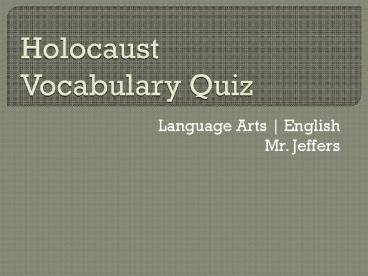Holocaust Vocabulary Quiz - PowerPoint PPT Presentation
1 / 56
Title:
Holocaust Vocabulary Quiz
Description:
Language Arts | English Mr. Jeffers The act of gaining equal rights or full social or economic opportunities for a certain group of people. In WWII, this refers to ... – PowerPoint PPT presentation
Number of Views:218
Avg rating:3.0/5.0
Title: Holocaust Vocabulary Quiz
1
Holocaust Vocabulary Quiz
- Language Arts English
- Mr. Jeffers
2
Directions
If youre using an iPod, simply scroll through
each of the slides to view the vocabulary word
first. Then, on the slide following each
vocabulary word, youll find the definition.
Enjoy!
3
stereotype
4
stereotype
- a standardized mental picture that describes an
oversimplified opinion or prejudiced attitude a
label of identity placed on a person or group of
people, e.g. Jock or Prep.
5
prejudice
6
prejudice
- An unfavorable opinion or feeling formed
beforehand or without knowledge, thought, or
reasonoftentimes regarding racial, religious, or
national groups.
7
racism
8
racism
- Hatred or intolerance of another race or people
from a different ethnic background.
9
anti-Semitism
10
anti-Semitism
- Prejudice, hostility, or discrimination against
Jews.
11
genocide
12
genocide
- The deliberate and systematic killing of a
national, racial, political, or cultural group
13
Holocaust
14
Holocaust
- The systematic mass slaughter of European Jews in
Nazi concentration camps during World War II
15
Gestapo
16
Gestapo
- The German state secret police during the Nazi
regime between 1933-1945. It was notorious for
its brutal methods.
17
oppression
18
oppression
- the exercise of power in a cruel or unjust manner.
19
pogrom
20
pogrom
- an organized attack or massacre, especially
targeting Jews.
21
Nazi
22
Nazi
- a member of the National Socialist German
Workers party in Germany, which in 1933, under
Adolf Hitler, seized control of the country,
disallowed all opposition, promoted
anti-Semitism, and Hitlers supremacy. The party
was abolished in 1945.
23
propaganda
Hitler is building. Help him. Buy German goods.
24
propaganda
- Information, ideas, or rumors deliberately spread
widely in order to either help or harm a person,
group, movement, institution, or nation.
25
resistance
26
resistance
- The act or power of resisting, opposing, or
withstanding.
27
liquidation
28
liquidation
- The act of clearing out or doing away with
products or commodities. In the Holocaust, this
term was applied to the clearing out of Jews from
ghettos to the concentration camps or the gassing
of Jews within the death camps.
29
ghetto
Bridge over Chlodna street connecting two sides
of the Warsaw Ghetto.
30
ghetto
- A walled-off section of a city in which all Jews
were required to live.
31
concentration camp
View of a section of the barracks and fence at
Auschwitz in 1945 during liberation.
32
concentration camp
- A guarded compound for the detention or
imprisonment of members of ethnic minorities,
political opponents, Jews, prisoners, et cetera,
especially any camps created by Nazis prior to
and during World War II.
33
liberation
34
liberation
- The act of gaining equal rights or full social or
economic opportunities for a certain group of
people. - In WWII, this refers to the liberation of Jews
and other oppressed people from the concentration
camps.
35
death camp
36
death camp
- A concentration camp in which the inmates are
unlikely to survive or to which they have been
sent to be executed. - There were six death camps during World War II
Sobibor, Treblinka, Auschwitz-Birkenau, Madjanek,
Chelmno, and Belzec
37
tolerance
38
tolerance
- A fair and objective attitude toward those whose
opinions, practices, race, religion, nationality
differ from ones own.
39
ostracism
40
ostracism
- Exclusion from social acceptance, privileges,
rights, and friendship.
41
communist
42
communist
- A person who believes in a system of government
based on the holding of all property and goods in
common the government actually owns all property
and distributes it to the people. The Soviet
Union was a communist country during WWII.
43
socialist
44
socialist
- A person who lives in a social system in which a
community owns property, goods, and land together.
45
allies
46
allies
- People that have entered into an alliance, unity,
league, marriage, et cetera. - From an American perspective, in WWII, the allies
were comprised of the United States, France,
Great Britain (England, Scotland, and Wales), and
Russia.
47
Auschwitz-Birkenau
Entrance to Auschwitz I Arbeit Macht Frei
means Work Makes You Free.
48
Auschwitz-Birkenau
- A network of concentration and death camps built
by Nazis and located in Poland. Auschwitz was the
biggest of the concentration camps and accounted
for approximately1,100,000 deaths of innocent
people, 90 of whom were Jews.
49
bystander
50
bystander
- A person present but not involved a chance
spectator an onlooker
51
The Final Solution
52
The Final Solution
- A code phrase for a plan to destroy all Jewish
people. The architect of the plan was one of
Hitlers right-hand men Heinrich Himmler.
53
The Big Lie
54
The Big Lie
- The unjust, untrue rumor that Hitler used to
blame Jews for all unemployment, the loss of
World War I, and any other serious problem that
Germany faced. The Nazis spread propaganda all
around Germany to convince gentiles that The Big
Lie was true.
55
Axis Forces
56
Axis Forces
- The alliance between three fascist nations during
World War II Germany, Italy, and Japan. The Axis
Forces were the enemy of the United States.































